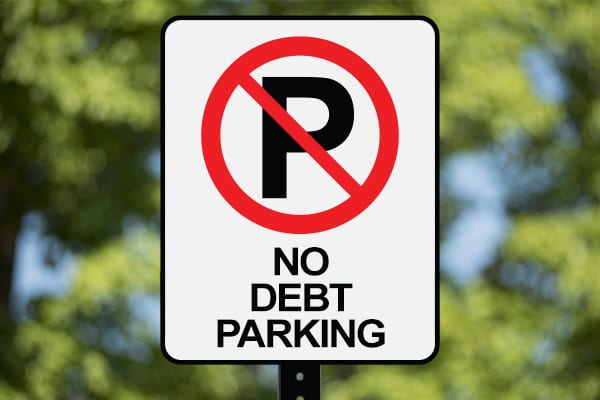Dealing with debt collectors already is an unpleasant encounter, but some collectors have found a way to sour the experience even more.
It’s called debt parking and if you haven’t checked your credit report in a while, RUN and do so. You might already have been ticketed for debt parking by unscrupulous collection agencies.
What Is Debt Parking?
Debt parking is when a collection agency places debts – some of which may not even belong to you! – on your credit report without first communicating with you.
Those debts negatively influence your credit score until you discover them, either by checking your credit report and asking: “How the heck did this thing get here?” or by having a home, car loan or possibly a job offer rejected because your credit score plummeted due to debt parking.
In other words, there is a steep price to pay for victims of debt parking. Many consumers get intimidated and pay the “false” debt quickly so they don’t lose out on the loan or job offer, rather than investigating it, finding out it was illegitimate and disputing the debt.
FTC Investigation on Debt Parking
The Federal Trade Commission found plenty of evidence of all of that and more while investigating a debt collection agency called Midwest Recovery Systems. The FTC said Midwest collected more than $24 million in payments from customers between 2015 and 2020, despite receiving thousands of complaints every month about its debt parking practice.
What makes Midwest’s offense even more egregious is the company found that more than 90% the debts it investigated were inaccurate or not valid. The Fair Debt Collection Practices Act requires collection agencies to verify all debts and bars them from giving false information to anyone, including credit bureaus.
“The defendants used this illegal ‘debt parking’ to coerce people into to pay debts they didn’t owe or didn’t recognize,” Andrew Smith, Director of the FTC’s Bureaus of Consumer Protection said in a news release. “The defendants parked fake or questionable debts on people’s credit reports and then waited for them to notice the damage when they were trying to get a loan or job.”
In one case cited by the FTC, a consumer’s home loan was jeopardized because his credit score fell due to a $1,500 hospital debt that Midwest parked on his credit report. He checked with the hospital and found out he only owed a co-pay of $80. He promptly paid the $80, but Midwest refused to remove the $1,500 debt from his credit report and threatened him with a lawsuit if he didn’t pay the full amount.
That was a familiar strong-arm tactic for Midwest, which the FTC says reported $98 million in bogus or highly questionable debts to the three major credit reporting bureaus. Those debts included payday loans, medical bills and debts people already had paid.
Medical debt, which is the source of much confusion among consumers, made up the majority of the debts parked by Midwest. It is estimated that more than half the 43 million consumers with medical bills have seen their debt sent to collection agencies. The uncertainty from consumers about how much they owe and when the medical bill is due makes them prime candidates for debt parking schemes.
What to Do About Debt Parking
The remedy for consumers is to take advantage of the free annual credit reports offered by the three major credit reporting agencies, Experian, Equifax and TransUnion and study them closely. The law says that each bureau must give you one credit report every 12 months, but during the COVID-19 crisis, all three agencies are offering free reports on a monthly basis.
Check each credit report closely and be sure all the debts listed do belong to you. If not, contact the bureau and report the mistake immediately.

3 MINUTE READ
Home » InCharge Blog »
Sources:
- Fair, L. (2020, November 30) Setting the debt parking brake. Retrieved from https://www.ftc.gov/news-events/blogs/business-blog/2020/11/setting-debt-parking-brake
- Mayfield, J. (2020, November 30) FTC Stops Debt Collector’s Alleged “Debt Parking” Scheme, Requires it to Delete Debts it Placed on Consumers’ Credit Reports. Retrieved from https://www.ftc.gov/news-events/press-releases/2020/11/ftc-stops-debt-collectors-alleged-debt-parking-scheme-requires-it

















